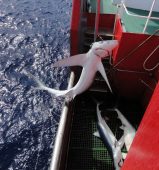Even in the most remote parts of the world’s oceans migratory sharks are in severe danger from commercial fishing fleets, new research reveals.
In a paper published in the journal Nature, more than 150 scientists, including Professor Rob Harcourt from the Department of Biological Sciences at Australia’s Macquarie University, uncover why large species inhabiting the open ocean account for over half of all identified sharks caught globally as fisheries targets or bycatch.
“This paper shows that pelagic sharks converge on what we call ‘hotspots’ in the oceans, where there are high concentrations of prey,” Professor Harcourt says.
“Unfortunately, for the very same reason, fishing fleets head there, too. This makes the sharks more vulnerable and the need to protect them much more urgent.”
Declines in global shark populations have been noted for decades, including those of iconic species such as the shortfin mako (Isurus oxyrinchus) and the great white (Carcharodon carcharias).
Because country-specific protections do not, by definition, extend beyond national jurisdictions, calls for management strategies on the high seas have been growing.
But precisely where in the vast expanse of the open oceans the sharks congregate – and how much fishing takes place in those chosen habitats – has been poorly understood until now.
To better analyse the situation, Professor Harcourt joined colleagues from Australia and scientists from 25 other countries to collect and collate data from nearly 2000 sharks tracked using satellite transmitter tags. The researchers mapped positions and identified hotspots in unprecedented detail.
They found multi-species pelagic shark communities were mostly located in frontal zones – highly productive and food-rich boundaries in the sea between different water masses.
Professor Harcourt and colleagues then calculated how many of these zones were visited by global fishing fleets that use longlines – the type of gear that catches most pelagic sharks. In a typical fleet, ships can deploy 100-kilometre-long lines, each bearing 1200 baited hooks.
They found that almost a quarter of the ocean spaces used by the sharks each month were also used by the fleets.
Strikingly, they found 24% of the feeding zones used in any given month fell under the footprint of longline fisheries. For commercially exploited species such as the North Atlantic blue (Prionace glauca) and shortfin mako the overlap was much higher, averaging 76% and 62% of their space respectively.
Even internationally protected sharks such as great white and porbeagle (Lamna nasus) had overlap values exceeding 50%.
“Our results show major high seas fishing activities are currently centred on ecologically important shark hotspots worldwide,” says Professor David Sims, who led the study as part of the Global Shark Movement Project based at the Marine Biological Association Laboratory in Plymouth, UK.
“Some shark hotspots were exposed to higher than average fishing effort for as much as half the year,” adds lead researcher Dr Nuno Queiroz, from the University of Porto in Portugal.
Very few identified hotspots were free of fishing activity all year round.
The findings indicate large sharks face a future with limited refuge from industrial longline fishing.
It is a point Professor Harcourt is keen to emphasise.
“The short fin mako actually has quite good status in Australian waters, because we manage our fish stocks reasonably well,” he says.
“But sharks don’t see the boundaries of our exclusive economic zone and head off into deeper waters, where there is much less protection from international fishing fleets. So even though we protect them well, unless we can create the same levels of protection right across Oceania they will remain in danger of severe depletion.”
The other Australian researchers involved in writing the study were Mark Meekan and Michele Thums from the Australian Institute of Marine Science (AIMS), Graeme Hays from Deakin University and Ana Sequeira from University of Western Australia, with data contributions from many others.
The paper is available online at:

Blue shark caught by Atlantic longline Photo credit MBA





